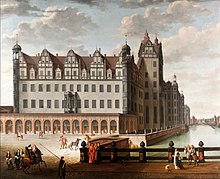Berlin Religious Discussion
The Berlin Religious Discussion was a religious discourse between Lutheran and Reformed theologians of the Mark Brandenburg with the aim of bringing the two Protestant denominations closer together . It took place at the summoning of the Great Elector from September 8, 1662 to May 29, 1663 in the Berlin Castle of Cölln under the direction of Brandenburg's First Minister Otto von Schwerin . After 17 meetings it was canceled without result.
prehistory
The background to the discussions was on the one hand the reformed confession of the elector and part of the court since Johann Sigismund's change of denomination in 1613, on the other hand the Lutheran denomination of most of the parishes in the country; in 1577 all clergymen and schoolmasters of Brandenburg in Berlin were committed to the concord formula .
On June 2, 1662, the elector had issued an edict of tolerance that obliged the country's Lutheran preachers to tolerate the reformed confession. The representatives of Lutheran orthodoxy saw this as an inadmissible relativization of the confessional basis of the regional church . The elector wanted to break their resistance with the religious talk.
Participants and course
The leading theologian on the Reformed side was the court preacher Bartholomäus Stosch . The Lutherans' spokesman was - since provost Georg Lilien , the highest-ranking clergyman, was already at an advanced age - court preacher Elias Siegesmund Reinhard . Provost Andreas Fromm assumed a mediating position .
The main subject of the polemic between Lutherans and Reformed was the doctrine and practice of the Lord's Supper , and related details of Christology , as well as the doctrine of predestination and the exorcism formula at baptism, which was retained in the Lutheran agendas .
The Irish line of the Helmstedt Lutheran Georg Calixt († 1656) should be decisive in the religious discussion . However, the Lutheran participants, including Paul Gerhardt , were strongly against the supposed syncretism and followed the strictly Lutheran line of Abraham Calov from Wittenberg .
consequences
As early as August 21, 1662, at the same time as the religious discussion was called, the elector had forbidden his country's candidates for a pastor from studying in Wittenberg, Saxony . With the second edict of tolerance of September 16, 1664, he prescribed that the Lutheran clergy refrain from making diatribes against the Reformed, on punishment for impeachment.
In the tradition of the state-prescribed tolerance between the main Protestant denominations, the later efforts for a union in Prussia, which were finally established in 1817 by Friedrich Wilhelm III. was completed.
literature
- Johannes M. Ruschke: Paul Gerhardt and the Berlin church dispute. An examination of the denominational disputes about the electorally decreed 'mutua tolerantia' (= contributions to historical theology; vol. 166), Mohr Siebeck, Tübingen 2012. ISBN 978-3-16-150952-0 .
- Hans-Joachim Beeskow : "Get out of my heart and look for Freud ..." - On the historical context of Paul Gerhardt's songs . In: Berlin monthly magazine ( Luisenstädtischer Bildungsverein ) . Issue 7, 1997, ISSN 0944-5560 , p. 15–21, here p. 18 ( luise-berlin.de ).
Individual evidence
- ↑ Beeskow, p. 18
- ↑ preussen-chronik.de (article Otto Reichsfreiherr von Schwerin )
- ↑ Lilien (Lilius), Georg von . In: Lothar Noack, Jürgen Splett: Bio-Bibliographien. Brandenburg scholars of the early modern period. Berlin-Cölln 1640–1688 . de Gruyter, Berlin 1997, pp. 225–243, here p. 230.
- ↑ Fromm, Andreas . In: Lothar Noack, Jürgen Splett: Bio-Bibliographien. Brandenburg scholars of the early modern period. Berlin-Cölln 1640–1688 . de Gruyter, Berlin 1997, pp. 124-137, here p. 128.
